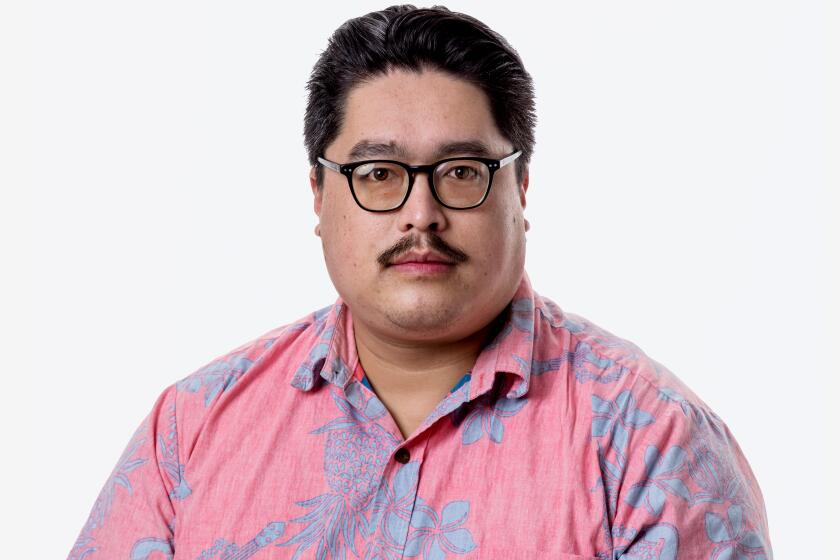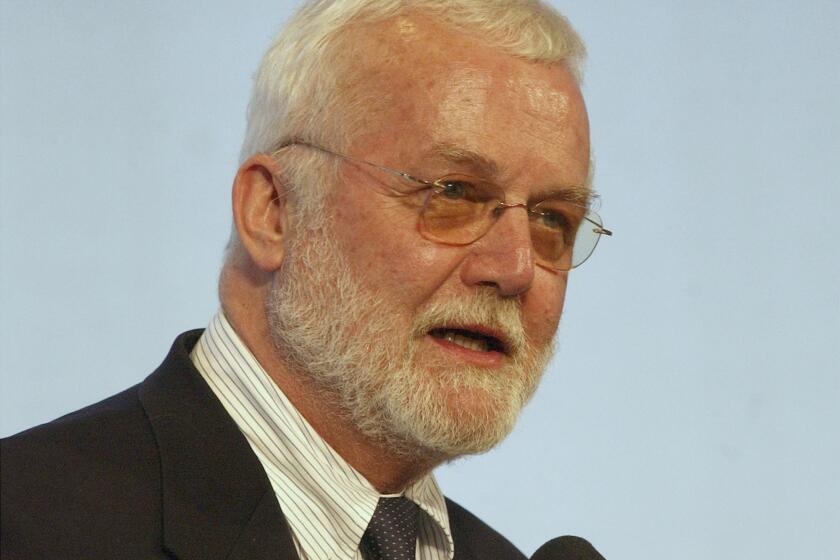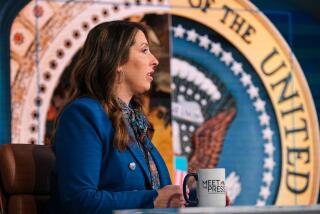Bernard Kalb, longtime foreign affairs newsman, dies at 100

- Share via
NORTH BETHESDA, Md. — Bernard Kalb, a former television reporter for CBS and NBC who quit his job as a State Department spokesman to protest a U.S. government disinformation campaign against Libya, died Sunday. He was 100.
His younger brother, Marvin Kalb, told the Washington Post that his death at his home in the Washington suburbs followed complications from a fall.
Bernard Kalb worked as a foreign correspondent for the New York Times, CBS and NBC; wrote two books with his more famous younger brother; and served as founding anchor and panelist for the CNN media analysis show “Reliable Sources.”
Always smartly dressed in a suit and orange tie often matched with an orange pocket handkerchief, Kalb was a tireless journalist who made virtually every overseas trip with five different secretaries of state before switching to the other side of the podium.
“You have a sense of being something of an eyewitness to the evolutions and eruptions of the decades since World War II,” he told the New York Times in 1984, when he became a spokesman for Secretary of State George Shultz during the Reagan administration.
“You have a historical memory to call upon, and you see the trust of American foreign policy and other foreign policy,” he said. “And it seems to me the ability to punch up American priorities, cast of characters, issues and so forth are very valuable in this assignment.”
A no-nonsense journalist, Hagihara was a Times editor when the paper was in a fierce circulation battle with the Orange County Register.
The disinformation campaign followed U.S. airstrikes that had hit Libyan leader Moammar Kadafi’s compound earlier in 1986 in retaliation for a Libyan-linked terrorist attack in Germany. It was designed to make Kadafi think he was about to be attacked again. The Washington Post exposed the campaign, which the newspaper said included leaking false information to reporters and which Kalb knew nothing about.
“I am concerned about the impact of any such program on the credibility of the United States,” Kalb said at the time. “Anything that hurts America’s credibility hurts America.”
New York Times columnist William Safire praised the resignation. “In his final official act, Bernard Kalb rose above ‘State Department spokesman’ to become the spokesman for all Americans who respect and demand the truth,” Safire wrote.
In 1992 Kalb became the founding anchor of “Reliable Sources,” which reported on reporters and how they handled stories. Co-host Howard Kurtz took over the show after the Sept. 11, 2001, terrorist attacks.
Yee joined The Times in summer 2021 as a night reporter, and he had been working as one of 18 reporters on the paper’s breaking news operation.
In 1997 Kalb began moderating a number of panels and lectures on the press around the world for the Freedom Forum, a Washington-based foundation devoted to press freedom run by former Gannett Co. executives. He also served on a panel that monitored Israeli and Palestinian media for incitement to violence that was created as part of the failed 1998 Wye River land-for-security accord.
Kalb was born Feb. 4, 1922, in New York City, the son of Jewish immigrants. His father was a tailor from Poland, while his mother was from Ukraine. He attended New York City public schools and graduated from New York’s City College.
During World War II, he spent two years in the Army, working for a camp newspaper in the Aleutian Islands alongside editor Sgt. Dashiell Hammett, author of “The Maltese Falcon” and other detective novels.
From 1946 until 1961, he worked at the New York Times, spending four months in Antarctica in late 1955 and 1956 to cover Adm. Richard Byrd’s Navy expedition, Operation Deep Freeze. Later in 1956, Kalb was dispatched to Indonesia, where he developed a lasting love for Asian antiques and porcelain.
Prize-winning author known for ‘Continental Drift’ and ‘Cloudsplitter’ had just published his 14th novel, ‘The Magic Kingdom.’
CBS hired him away in 1962 and sent him back to Southeast Asia, where he was well-known. He joined his brother covering the State Department in Washington in 1975, and they moved together to NBC in 1980.
At CBS Marvin and Bernard were known as “the Kalbs,” but Bernard lived somewhat in the shadow of his younger brother.
One widely circulated, but apocryphal, story had their mother calling the CBS foreign desk in New York and saying: “Hello, this is Marvin Kalb’s mother. Can you tell me where my son Bernie is?” But Bernard Kalb never seemed the least bit jealous, sometimes even introducing himself as Marvin’s “kid brother.”
Together they wrote “Kissinger,” an admiring 1974 biography of Henry Kissinger, and “The Last Ambassador,” a 1981 novel about the fall of Saigon.
Survivors include his wife, Phyllis, and their four daughters, Tanah, Marina, Claudia and Sarinah.
More to Read
Start your day right
Sign up for Essential California for the L.A. Times biggest news, features and recommendations in your inbox six days a week.
You may occasionally receive promotional content from the Los Angeles Times.










